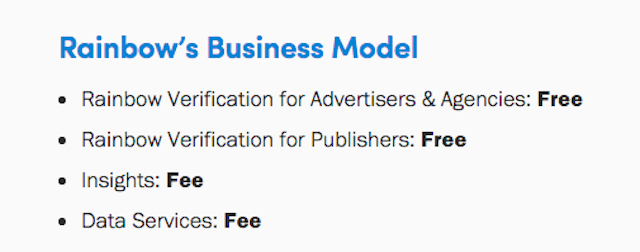Shine Technologies pivots to become an opt-in consumer service called Rainbow and launches first ad campaign
In what amounts to one of the more major pivots in the digital sector, Shine Technologies – a company entrenched in the ongoing adblocking debate – is to rebrand as Rainbow. It will cease its carte blanche adblocking services to mobile operators and begin generating revenue from the media industry, as it moves offer “a better ad experience for consumers”.
Billing itself “the guardian of the consumer experience”, Rainbow will offer those in the media business access to its “insights platform”, which they can then use to receive “creative verification” – a seal of approval that lets them bypass Rainbow’s filter system on cellular networks.
It’s a model the company has been working on with input from other players in the advertising industry including: the IAB’s UK arm; existing telco partner Three; the Mobile Marketing Association, as well as a number of media owners and network agencies.
This has been made possible by the company's latest round of funding ("several millions" from existing backers), and to announce this new consumer offering Rainbow will additionally embark upon a marketing campaign of its own.
Here, the narrative centers upon some of the more controversial elements of online behavioral ad targeting, with the brand preaching consumer control (see video at top of screen).
Consumers will be able to opt-in to the Rainbow offering by asking their mobile operator or ISP to turn it for them, which the Israel-based outfit claims will act as a “digital bill of rights” and provide them with “a better, cleaner, safer, more respectful ad experience.”
Ads submitted for the Rainbow experience will have to adhere already-established industry standards – such as the IAB’s LEAN principles, as well as those enshrined in the Coalition for Better Ads – with Shine’s network level technology used to vet said creative. Rainbow is adamant that it is not now an ad network, or adtech outfit, rather it is positioning itself as “a consumer experience company” (see below for the Rainbow business model).
Rainbow's staff told The Drum there will be two business models available to perspective customers with the outfit effectively launching an enterprise data licensing model available to advertisers, plus an additional one that will provide attributes to publishers.
Additionally, the service is aimed at helping telcos generate revenues from mobile advertising, but they stopped short of saying it would lead to the return of telco-owned ad networks.

Rainbow's existing telco partner Three will be involved at the launch of the service – the two outfits had conducted a day-long experiment to block all ads on its network midway through last year – with the Hutchison Whompoa-owned outfit poised to co-market the service among its customer base.
Rainbow's staff claim the service will limit the amount of tracking pixels firing on their devices and the ad campaigns are clearly geared towards articulating this to consumers, but the sell will likely be a difficult one to advertisers.
Late last year desktop-based AdBlock Plus attempted to launch a similar monetization service, with its advertising offering initially using AppNexus and Google DoubleClick technology, oversights that both of the adtech giants move swiftly to close down.
Such services have also had vocal critics within the industry, with IAB chief executive officer Randall Rothenberg labeling them "terrorists", while others have cast doubt on the philanthropic claims of those espousing it.
Although a recent survey of members of the Chartered Institute of Marketers found that most of those polled believed that the increase in adblocking usage would lead to an overall improvement in the advertising industry.
Speaking with The Drum at last year's MWC, Roi Carthy, CMO of Rainbow, said: “There is a lot of abusive tech out there, and absolutely no regulatory measures for the control of it."
He argued that mobile operators are some of the best positioned players to help establish such a consensus, and downgrade some of the abusive acts of adtech. But it is also worth remembering that it also positions them to potentially generate new revenue streams from ads served across their networks.
“We realize that if we get enough people to opt in, then we can get closer to that law and order,” added Carthy.

